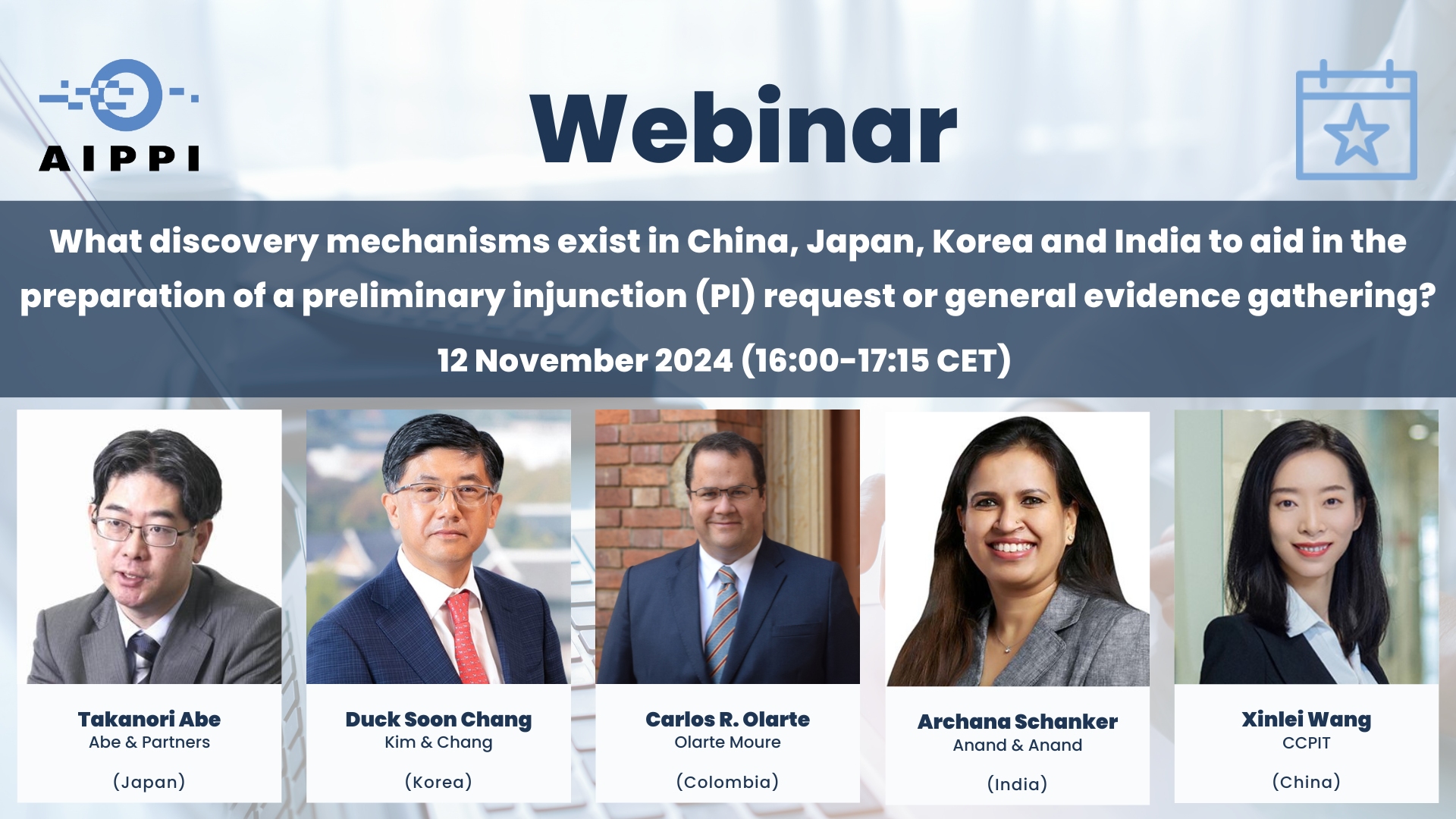AIPPI Pharma Webinar on 12 November
12 November 2024 - 12 November 2024 | Webinar | AIPPI

The AIPPI Pharma Committee is organising a webinar on 12 November (16:00-17:15 CET) to discuss the question: ‘What discovery mechanisms exist in China, Japan, Korea, and India to aid in the preparation of a preliminary injunction (PI) request or general evidence gathering?’
Discovery mechanisms are available in many countries in order to permit evidence gathering to prove certain facts necessary to meet a legal burden. Without discovery mechanisms, parties are left to obtain information solely from public sources or witnesses willing to cooperate. Discovery allows the parties to follow procedural rules to judicially compel the production of documents and information, without which it would be impossible or completely impractical to comply with an evidentiary burden, leaving a patent holder without effective legal recourse to enforce its rights.
In general, discovery mechanisms include pre-litigation motions designed to preserve evidence, as well as evidentiary requests made after filing a complaint, including depositions, written interrogatories and the production of documents. The scope of the discovery request can vary widely between jurisdictions, but in general the limits are imposed by the relevance of the information requested with the facts alleged in the complaint (or future case to be filed). In cases where the information sought is confidential, courts in certain jurisdictions will tailor and issue protective orders to ensure the confidentiality of said information.
Pharmaceutical litigation in particular presents serious evidentiary challenges when the patent under litigation relates to non-compound inventions, such as processes, formulations, polymorphs and isomers. In particular, showing infringement prior to launch (i.e. where the product is not available for inspection and testing) is in many cases impractical or impossible to show. Even in cases where some information is available, or where the burden of proof is inverted (e.g. process patents), access to confidential information is necessary to fully prove the infringement for purposes of obtaining a PI.
In this sense, it is important to identify what discovery mechanisms exist in different jurisdictions and identify differences and similarities. This information is useful to help guide potential litigants on the potential benefits of using certain jurisdictions to facilitate evidence gathering for regional or global campaigns.
Speakers
Takanori Abe
Takanori Abe, managing partner of ABE & PARTNERS, is an attorney-at-law, admitted to both Japan and New York. He is currently a guest professor at the Osaka University Graduate School of Medicine and was formerly a lecturer at the University of Tokyo Graduate School of Medicine and Faculty of Medicine. He is also a mediator and arbitrator in Japan.
One of Mr. Abe’s strongest fields is pharmaceutical patent cases. He has handled pharmaceutical cases between large pharmaceutical companies ranked within the top 10 around the world, some of which are bet-the-company cases, and he is currently involved in cases involving battles between brands, as well between brands and generics.
Duck Soon Chong
Duck-Soon Chang is an attorney at Kim & Chang. His principal practice areas include IP litigation, technology licensing, antitrust, and international arbitration.
Mr. Chang is currently the president of the Intellectual Property Training Institute of the Seoul Bar Association and a committee member of Korean Internet Address Dispute Resolution Committee. He was an advisor on IP related policies at Korea Fair Trade Commission from 2011 to 2014, and he also served as an advisor to the Korea Trade Commission (an equivalent to the USITC) on IP matters from 2008 to 2011.
In addition, he spent several years as the outside director of Yuhan Corporation, Seoul, Korea. He now has more than 20 years of experience as an arbitrator for the Korea Commercial Arbitration Board. Mr. Chang has been recommended as a Band 1 IP attorney for Korea by Chambers Asia since 2008 and has been selected as one of the world’s most preeminent patent lawyers by the International Who’s Who Legal every year since 2009.
Carlos R. Olarte
Carlos is a founding partner of OlarteMoure, a 220+ person IP and Competition Law firm based in Bogota, Colombia, with offices in Medellin, Barranquilla, Cali, Bucaramanga and Tokyo.
His professional practice includes developing and executing patent litigation strategies, as well as constructing licensing programs and growing portfolios for start-ups. A good portion of his practice focuses on the R&D pharmaceutical and life sciences industry, where his clients include leading Global 100 companies. Another focus is the telecom industry, where he has had the opportunity to lead the first two major SEP assertion campaigns in Colombia on behalf of the SEP owner.
Another important client base includes local universities and research-intensive industries, where the firm has taken a leading role in developing the local investment ecosystem for early-stage deeptech start-ups. The combination of his technical and legal expertise clearly distinguishes Carlos from most other patent practitioners in Colombia and Latin America.
Archana Schanker
Archana has 31 years of experience in all patent related matters (prosecution & contentious) especially in the fields of Bioinformatics, Pharmaceuticals, Biotechnology, Chemical, Regulatory issues, Software, Mechanical, Electronics, Geographical Indications, Plant Variety and Designs including providing strategic advise.
Specialties: Patent Prosecution, Patent Drafting, Patent Invalidations, Infringement Suits, Licensing and Agreements
Xinlei Wang
Xinlei is a Patent Attorney since 2019 and Attorney-at-law since 2016, specializing in various technical fields including Textiles, Paper Making and Printing, Computer Technology, Organic and Inorganic Chemistry, Agricultural Science & Technology, Chemical Engineering, and Medicine & Pharmaceuticals. Proficient in Chinese and English, with a Master’s in Bioengineering from the University of Illinois, Urbana-Champaign, and previous studies at The Scripps Research Institute and the University of Science and Technology of China. Joined CCPIT Patent and Trademark Law Office in 2017. Expertise includes Patent Invalidation, Litigation, Infringement, Legal Opinions, Administrative Protection, Licensing, Portfolio Management, and more. Achieved notable successes in 2020 and 2021 with patent invalidation cases for local companies.